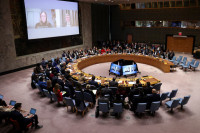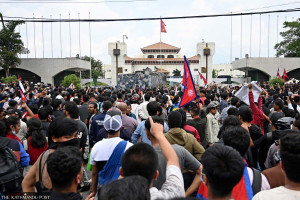Opinion
Making it work
Timely presentation of the budget will hopefully lead to timely execution of development projects
Dutta Shree Duwadi (khanal)
The government is busy preparing the budget that will be presented on May 28. Almost every sector of the country has high hopes that the upcoming budget will relieve them from the gloomy economic scenario prevailing in the nation.
The government has been reiterating that the upcoming budget would be a pragmatic and not a populist one. However, the budget should address—to the greatest extent possible—poverty, unemployment, inflation, black marketeering and reconstruction.
The budget provides a framework for almost all the policies and programmes of the government. So setting the objectives and priorities as per the country’s actual needs should be the focus while formulating the budget. In the wake of last year’s earthquakes and the trade embargo, new dimensions—reconstruction and effective supply side policy—are likely to find space in the upcoming budget. Under the pretext of these, the government also seems to be planning on increasing the budget size significantly—from last year’s Rs880 billion to over Rs1 trillion. But, as economist Madan Kumar Dahal suggests, the government needs to consider the possible price hike an increased money supply could trigger.
Priority sectors
The government could also increase subsidies to the agriculture sector. Experts and stakeholders have been demanding that the budget for the sector be significantly increased. Economist Bishwambhar Pyakurel says that the government will fail to achieve its targeted economic growth rate if the development of this important sector is not properly addressed. Pyakurel argues that the government must achieve a 10 percent growth in the agriculture sector to meet its target of six percent economic growth.
While allocating the budget for agriculture, proper assessment of the outcome of subsidised agro projects in the past needs to be conducted. There should be an obvious question: Were the subsidies helpful for the needy farmers or did they mostly serve a handful of influential groups?
Similarly, the need for bringing in policies to make banks and financial institutions provide a subsidised loan to farmers at six percent interest cannot be ruled out. Although the government, through last year’s budget, had introduced such a provision, a number of financial institutions have been reluctant to provide such loans to farmers. Moreover, enhanced irrigation system has to be prioritised to yield better results.
The government seems to be increasing the budget for infrastructure projects like Kathmandu-Nijgadh fast track, mid-hill highway, international airport in Bara, postal highway and road connectivity to China. The roads that are on the priority list include Biratnagar-Kimathanka, Mustang-Korala, the Karnali corridor connecting Hilsa, Galchhi-Syaphrubeshi-Rasuwagadhi and Kathmandu-Tatopani.
Similarly, Babai and Rani Jamra Kulariya irrigation projects and Budigandaki and West Seti hydropower projects are supposed to fall under the government’s priority projects. These projects, if they materialise, will indeed contribute to the country’s economic development. However, simply allocating money does not yield better results.
Reconstruction of physical infrastructure damaged by the earthquake will be another chief agenda of the budget. As per the National Planning Commission (NPC), Rs123 billion will be allocated for reconstruction in the next budget, compared to Rs91 billion allocated in this fiscal year. As the reconstruction process has already been delayed by months, there is a need to expedite it to provide relief to earthquake victims as soon as possible. Besides, speedy reconstruction of damaged shrines, among others, is essential to boost tourist inflow.
The bigger challenge
Implementation, rather than allocation, of the budget has been observed as the main setback in Nepal’s development. Almost every year, the government has failed to spend a large proportion of the capital expenditure allocated in the budget. This year too, the government had only spent 20 percent of the capital budget by April. The low expense capacity is mainly attributed to various procedural problems in awarding contracts. The existing public procurement act, along with the failure to hold contractors accountable if projects are not completed on time, are thought of as major problems behind low capital expenses.
Experts and lawmakers have long been demanding a strict penalising system to hold to account the contractors who abandon projects after accepting 20 percent of the project mobilisation cost. Taking action against such contractors, along with endorsing the bill on public procurement act that has currently been tabled in Parliament, could help solve the problem to some extent.
While implementing the budget, the government has been advised to follow the NPC recommendation that 10 percent of the total divisible pool for the ministries’ budgets be given based on a performance evaluation. Its study has also suggested that expenditure be made a basis for performance evaluation. Similarly, in the education sector, an incentive budget should be given to districts with the lowest dropout rate. However, these suggestions have not been heeded. Earlier, the Parliamentary Development Committee had also instructed the government to establish a system approach in budget allocation. But the main problem lies in political intervention in budget allocation and influential political leaders’ concern for their districts and constituencies, which lead to disproportionate distribution.
It will definitely be difficult for the government to decide whether or not to continue with or increase the budget allocated to parliament members-based programmes. Since the last two years, under the controversial Constituency Infrastructure Special Programme, the government has been providing to each member of parliament Rs15 million, which they have been demanding to increase to Rs50 million.
On the positive side, the government this year is going to present the budget on time as stipulated by the present constitution. Unlike traditional practices where the government announced its financial plans just before the end of the fiscal year, this time it is being done almost two-and-a-half months earlier. It will indeed provide ample time for Parliament to approve the budget and start the disbursement process. This is expected to resolve the problem caused by the delay in releasing the allocated money and lead to timely execution of development projects.
Duwadi is programme manager at the South Asian Institute of Policy Analysis and Leadership and can be contacted at [email protected]




 5.05°C Kathmandu
5.05°C Kathmandu












